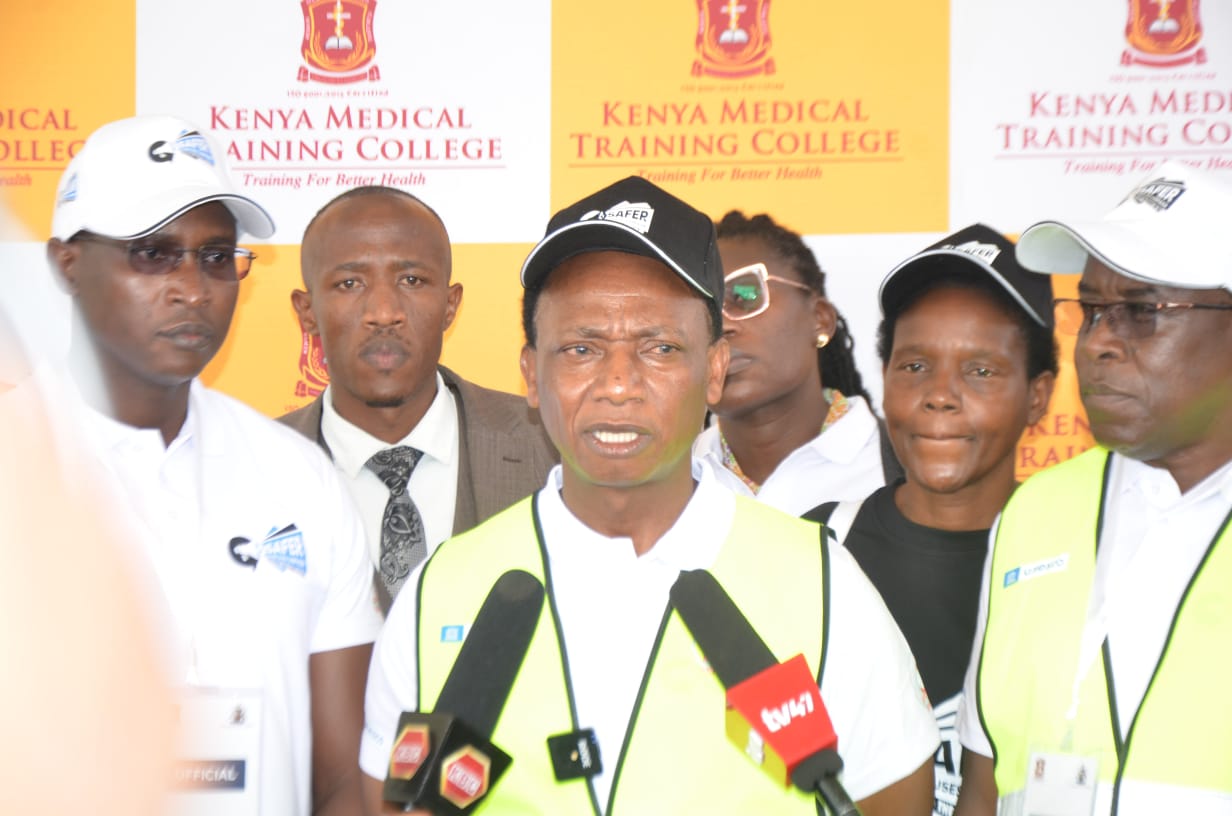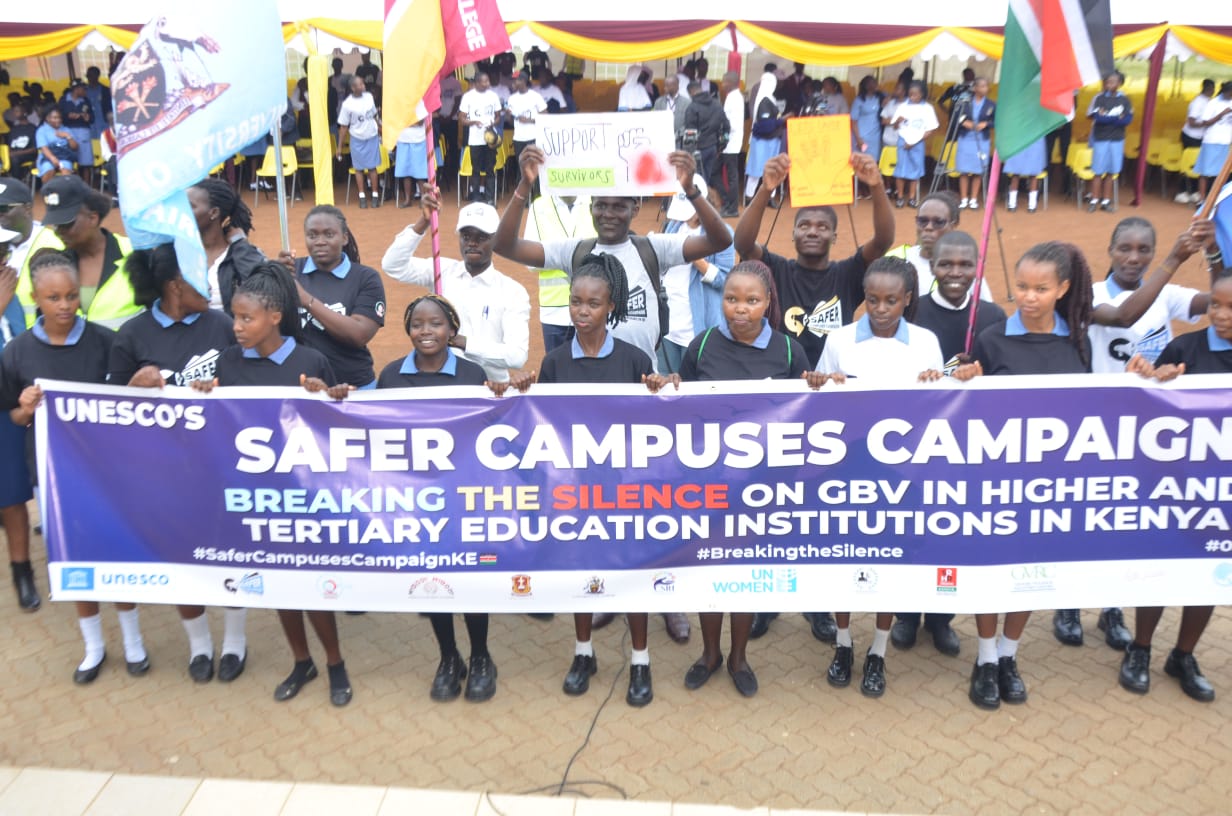UNESCO Unveils Safer Campuses Campaign to Curb Gender-Based Violence

UNESCO Regional Office for Eastern Africa has launched a campaign aimed at preventing gender-based violence(GBV) in Kenyan higher education institutions.
The campaign dubbed “Safer Campuses Campaign” will also foster a culture of safety and support, empowering everyone to prevent, report, and respond to GBV.
Speaking during the launch, Kelly Oluoch, chief executive, Kenya Medical Training College said institutions of higher learning should be free of violence, HIV AIDS and any form of diseases.
“Students should be able to learn in a conducive environment free of drugs, alcohol and any form of violence,”he noted.
Jackson Kioko, chief executive, Kenya Health Professionals Oversight Authority noted that tye government through the Ministry of Health is committed to ensure students achieve the best by providing the necessary support in eradicating violence and enabling a disease free environment.
“The government will continue to work with UNESCO and all partners to ensure students well being is taken care,” Kioko said on behalf of Mary Muthoni, Principal Secretary, State Department of Public Health and Professional Standards.
Mamadou Lamine, UNESCO Chief of Education highlighted the importance of cooperation among key stakeholders in preventing Gender Based Violence in Higher and Tertiary Education Institutions.
“We should use all means to avert violence especially in campuses through education and public awareness, to foster health & well-being of young people,” he said.
He added that UNESCO continues to partner with the Kenya Medical Training College (KMTC) and the University of Nairobi (UoN) to implement Our Rights, Our Lives, Our Future PLUS (O3PLUS) project that aims to promote the health and well-being of young people, and ensure they realize the highest positive health, education, and gender equality outcomes.
The Safer Campuses campaign is being rolled out in six countries in Eastern and Southern Africa including Kenya, Tanzania, Namibia, Zimbabwe, Zambia and Uganda with support from UNESCO and partners.
The launch also commemorates the International Day of Non-Violence, observed annually on 2 October, to commemorate Mahatma Gandhis birthday, world leader and pioneer of the philosophy and strategy of non-violence.
He added that,”This is a reminder that we should use all means to avert violence especially in campuses through education and public awareness, to foster health and well-being of young people.”
In addition, Lamine noted the launch of the KMTC Gender Desk and Wellness Center marks the second institution in the country to achieve such a milestone, the first being University of Nairobi.
As the global lead agency for the Sustainable Development Goal 4 UNESCO continues to cultivate strategic partnerships that contribute to creation of safe spaces within institutions of learning.
The UoN initiatives including the established Gender desk, Wellness Center and the Campus Me Too movement are exemplary indicators that positive health outcomes can only be achieved through sustained reductions in new HIV infections, unintended pregnancy, and gender-based violence.
Gender-based violence is a pervasive, persistent, and prevalent global problem connected to crime, capital, power, and hegemons, and knows no social, economic, cultural or caste confinement.
It occurs in families, schools, colleges, universities, workplaces, and communities around the world. In these contexts, gender-based violence has negative effects on the personal health and well-being of university staff, lecturers, and students alike.
GBV is a growing concern as it is not only an infringement on the rights of the survivors, but it also impacts on the achievement of personal and developmental goals related to equal access to education for boys and girls.
“We must play our role to ensure the vulnerabilities to sexual and reproductive health and rights (SRHR) related concerns and risks are addressed, as learners navigate new responsibilities, relationships, and experiences on their own and in unfamiliar settings,” Lamine stated
The potential for young people to act as agents of change, as has been displayed by the groups of students in diverse art forms, provides one of the greatest hopes for achieving the social transformation necessary to end GBV and can be unlocked through high-quality, gender sensitive learning programmes. 
UNESCO will continue to partner with institutions of higher learners, UN agencies and CSOs in the Safer Campus campaign initiative that offers room for normative change and has the potential to address gender inequalities and ultimately contribute to the prevention of GBV.





